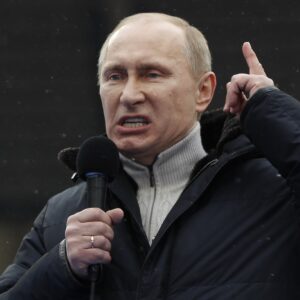How has the interaction between psychology and politics helped to manufacture Russian support for Vladimir Putin’s war in Ukraine? And is there anything anyone can do about it?
Here at Larger Us, we think a lot about them-and-us dynamics – dynamics which Putin appears to have had considerable success in stoking with regard to his war in Ukraine. 50-60% of the Russian public are in favour of his actions, as far as analysts can tell, with many Russians refusing to believe accounts of atrocities even when they come from their own relatives living in Ukraine.
Much of this is rooted in how Putin controls Russia’s information ecosystem. No independent coverage remains; all TV channels now parrot Putin’s line. Fake news and conspiracy theories, too, have long been part of the Kremlin’s comms playbook at home as much as abroad, as Peter Pomerantsev sets out in his superb book Nothing is True and Everything is Possible.
But at a deeper level, Putin has excelled at manipulating the psychology of grievance. The power of this has been compellingly explored by Vamık Volkan, a psychiatrist who specialises in conflict resolution. One of Volkan’s core ideas is that when a group’s identity is threatened after a loss of power, status, or prestige, it becomes psychologically essential to reestablish it.
If societies don’t work through their sense of loss through a process of mourning, he continues, it can become central to group identity – which in turn makes them vulnerable to manipulation by destructive leaders who play on old wounds. Serbia and Milosevic offer one example; Trump, with his MAGA story of how America used to be great (and could be again), another.
Putin is a case in point too. For years, he’s spun a narrative of humiliation at the hands of the West. As Sam Freedman notes in a recent blog (£), this was the backdrop to his sudden, rapid occupation of Crimea in 2014, when his previously lagging popularity levels suddenly shot up to their highest ever levels amid “the first substantive national ‘victory’ in the lifetime of most Russians”. He continues:
“Anyone under 50 had lived their whole life through decades of decline, from the failed Soviet invasion of Afghanistan to the fall of the USSR, and then the ignominy of the Yeltsin years. Before Putin came to power they’d struggled to win a war against Chechen rebels. Suddenly they had reasserted global authority in the face of American protests. It felt to many like the end of the decline.”
It seems likely that Putin expected another quick victory in this new war in Ukraine, that would boost his public standing in the same way as happened in 2014 – a catastrophic miscalculation, which has instead left Russia mired in a politically (and possibly militarily) unwinnable war, with immense costs for Russia in terms of lives, prosperity, and global standing.
What really scares me about the current situation is the risk that this dynamic now starts to self-amplify. Russians’ sense of humiliation and victimhood seems certain to increase as a result of Putin’s disastrous war. It’s easy to see how this might lead Putin to double down, for instance through levelling Ukrainian cities in the same way he did in Grozny or Aleppo – or worse.
So is there any way of de-escalating the sense of loss and grievance felt by ordinary Russians, given the immense harm this has caused in the hands of a manipulative leader like Putin, and the scope for it to do much more as the war drags on?
I don’t have a neat answer to that question, but I am struck by the extent to which two of the most impressive pieces of storytelling I’ve seen during the war – a war in which narrative has become crucial, as Yuval Noah Hariri notes – have offered some powerful pointers.
One is the extraordinary address made by Volodymyr Zelensky on the eve of war; the other, the viral speech made by Arnold Schwarzenegger just last week, which Alastair Campbell hailed as a masterpiece. Five points stood out for me.
First, both speeches were addressed to ordinary Russians; in Zelenksy’s case, the speech was given in Russian, with a clear distinction between the Russian state on one hand, and its people on the other. Schwarzenegger goes further, addressing his speech to “my dear Russian friends” and telling stories of his friendships with Russians. It reminded me of the Radical Love campaign in Turkey, with its principle to “Ignore Erdogan, but love the people that love him”.
Second, there’s a strong emphasis on what we share. Zelenksy talks repeatedly about “the people” – which, he makes clear, includes both Ukrainians and Russians:
“Who will suffer the most from [the war]? The people. Who doesn’t want it the most? The people! Who can stop it? The people. But are there those people among you? I am sure.”
Schwarzenegger echoes the point, noting that “Those who don’t deserve it, on both sides of the war, will suffer”. He also draws a parallel between Putin’s war in Ukraine and the 6 January Capitol insurrection in the US, saying “You see, there are moments like this that are so wrong and then we have to speak up. And it’s exactly the same [in this case].”
Conversely, third, both speeches avoid othering. While neither speech shies away from addressing the terrible human cost of war, there’s no contempt or shaming that would feed the sense of humiliation and victimhood that Putin has long preyed upon. Instead, both speeches are respectful.
Fourth, both speeches are calm; reassuring, even. There’s nothing in either speech that takes Russian audiences into a ‘fight-or-flight’ state – something that would work to the advantage of a leader like Putin, given how fight-or-flight states make us lock into our in-groups while making us more aggressive and worse at critical thinking (a dynamic brilliantly explored by Karen Stenner).
Fifth and finally, both speeches seek to empower their Russian audience with a sense of agency. Zelensky tells Russians that “if the Russian leaders don’t want to sit with us behind the table for the sake of peace, maybe they will sit behind the table with you”. More recently, he’s appealed directly to Russian mothers to stop their sons entering the war. Schwarzenegger, meanwhile, invites Russians to “help spread the truth” about a “human catastrophe”, before closing with a message to Russian protestors: “you are my new heroes”.
To be sure, peace seems a very distant hope right now. As Russian analyst Alexander Gabuev explores in a must-read interview, Putin is in a strong position – with control of the media, a pliant elite, an educated class desperate to emigrate, a disorganised opposition, plenty of scope to increase repression of protest, and enough economic self-sufficiency to survive.
But even if it took a decade to reach peace, it seems clear that the path towards it would run through de-escalating the sense of victimhood and humiliation felt by ordinary Russians. (Look at how a similar sense of grievance and loss in Germany helped set the stage for Hitler’s rise after World War 1 – and how the peace after World War 2 was built on defusing it.)
And until then, there is every reason to avoid aggravating that sense of loss and grievance as much as possible, given that the more it’s triggered, the more it puts Putin in his familiar comfort zone. The whole point about them-and-us stories is that they provide oxygen for authoritarians like Putin. This is why they play down what we share and lead with othering and division; why they trigger people into fight-or-flight, and invite them to hand their agency over to strongmen.
Conversely, stories of dignity and solidarity – of a larger us rather than a them-and-us – do the opposite. As Maria Stephan (who with her co-author Erica Chenoweth wrote the book on how nonviolent resistance can overthrow autocratic regimes) explores in a deeply hopeful post, these are the stories that we need to draw on in order to overcome authoritarians like Putin and Trump; just as it was stories like these that triumphed in the 2014 Euromaidan protests that ended Viktor Yanukoych’s rule and made modern Ukraine.
Something else we talk about in our work at Larger Us is how collective stories can become self-fulfilling prophecies. When enough of us believe them and start to act accordingly, our behaviours can make them come true. The example we usually use is what happens in a run on a bank, when enough people stop believing the bank has enough money to meet its deposits, and start to queue up outside. It’s what happens every time a dictator is toppled, too.


